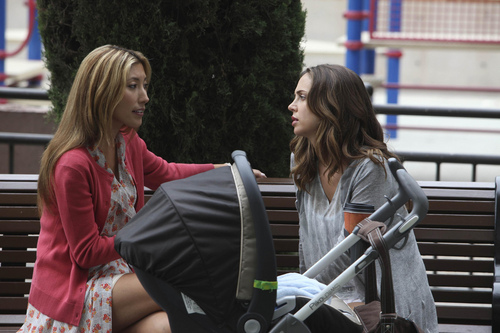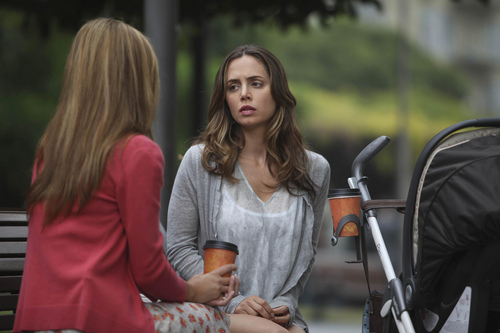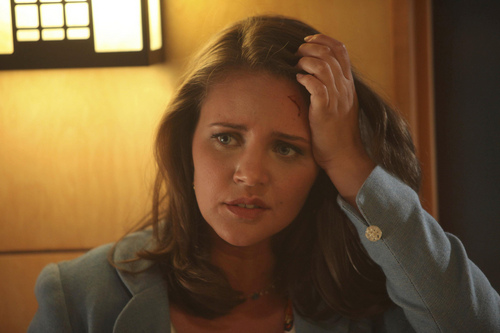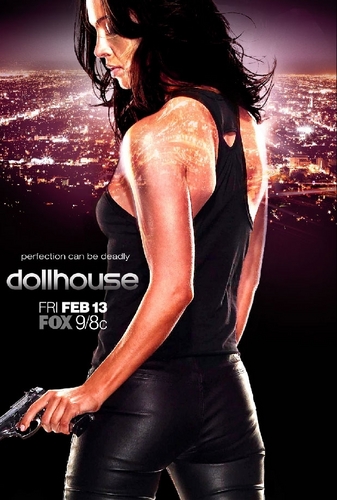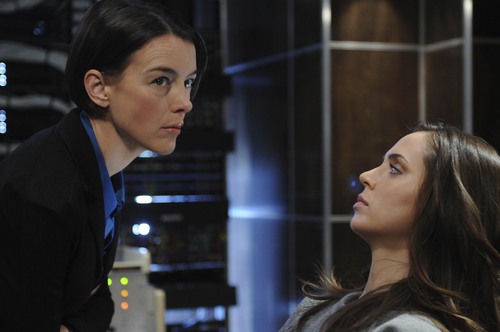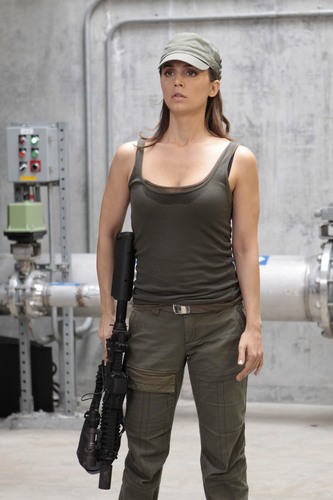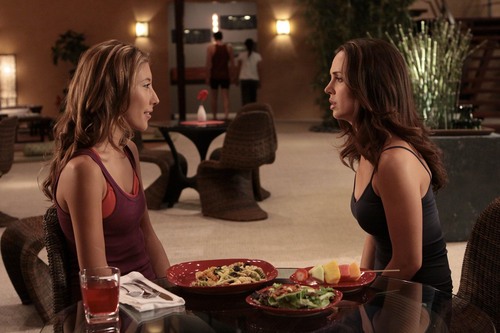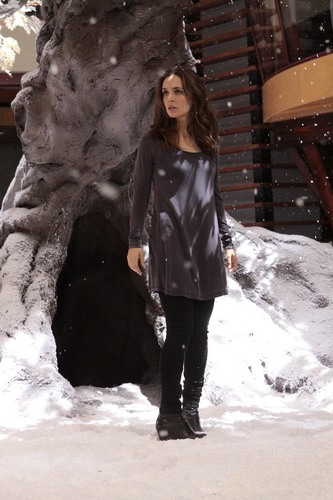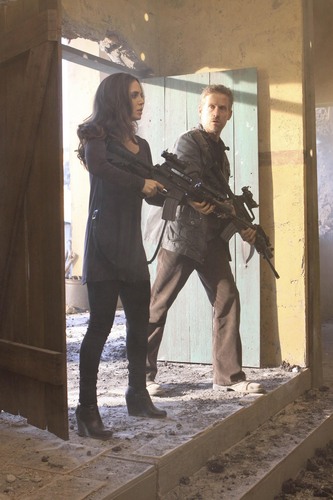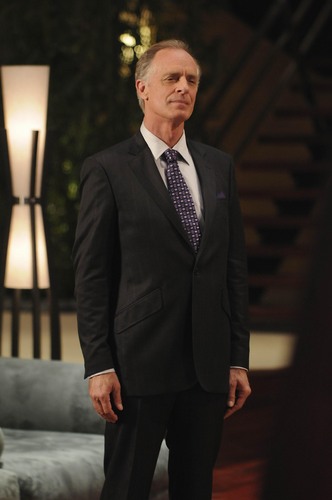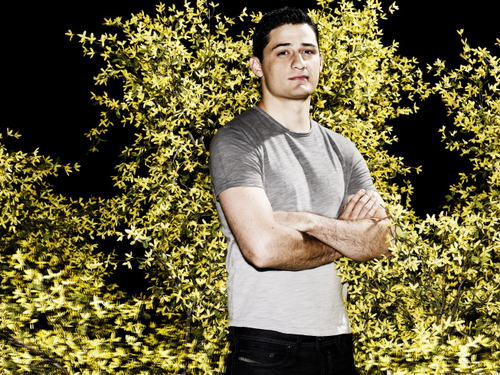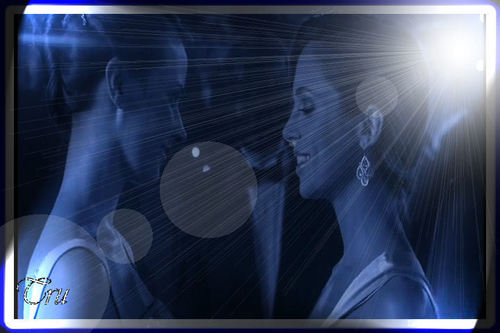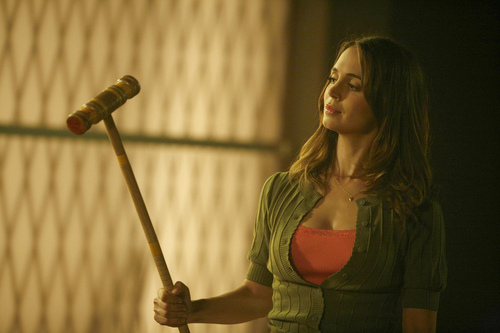It is mind-boggling to me that most of the feminist blogosphere is convinced that Joss Whedon’s Dollhouse is antifeminist and misogynistic. Not just extremely over the topo, início feminists like link, but mainstream persons with whose opinions I would usually agree. As far as I’m concerned, Dollhouse is incredibly feminist, save only for some problematic sexualizing that was most likely executive meddling and not Joss’ intention. As many would have it, though, Dollhouse’s creation made Joss reveal his true as cores as a misogynist. This is a mistake. The show depicts the female character Echo fighting against oppressive authorities, and we are on her side despite many of the corrupt authority figures being sympathetic characters.
A piece of trivia often brought up is that Joss has said Dollhouse is not a feminist show. This is a misquote of some things he said at his cultural humanism award acceptance link. He brought up an artigo criticizing Dollhouse for not being an obvious “feminist screed” and he then denied composição literária a screed, saying it’s a drama about characters and not a speech. What he actually said was:
Having come out publicly as a professed feminist and a professed humanist, everybody is judging what I do por that. I just read today an artigo in the Washington Post that said 'fans are calling Dollhouse a feminist screed and we're not seeing it.' Well, I'm not seeing it either 'cause it's not. It's a work of fiction that I am creating. And if you start doing that... If you start using your drama for didacticism just to make a point, you’re not making drama. You’re speechwriting, and people will smell it. They will walk away. Because it’s not human condition to be told what to do. It’s the human condition to try and figure it out.
And later, when a fã asked him a pergunta about whether he intended Dollhouse to commentate on the objectification of women (he intended it to talk about how everyone is objectified), she paraphrased him as saying “Dollhouse is not a feminist show”. Joss Whedon did not say that. A fã said he said that, in a specific context where he was just talking about not composição literária a screed. He also earlier talked about composição literária Buffy in a progressive, feminist way, and it should be clear that Buffy was intended to preach feminist values even as it works as a drama with well-rounded characters.
What it seems to me to be the problem is confusion and miscommunication over the phrase “feminist show”. It means different things to different people. At the cultural humanism event, the fã used it to mean “feminist screed” as Joss had just discussed. Taken out of context, people interpret it as meaning “misogynistic show” or “potentially misogynistic show because Joss doesn’t care about feminism anymore”, and then proceed to interpret Dollhouse with this preconception of the creator.
Let’s look at that phrase. What makes something a feminist show? I can think of three basic definitions: 1) Having a feminist creator, 2) Having a feminist character or characters, or 3) Having feminist themes.
Well, Joss is an ardent advocate of feminism. One only needs to look at his Equality Now link to see that. The whole speech is nice, but this part really speaks of his feminist beliefs:
Equality is not a concept. It's not something we should be striving for. It's a necessity. Equality is like gravity. We need it to stand on this earth as men and women. And the misogyny that is in every culture is not a true part of the human condition. It is life out of balance, and that imbalance is sucking something out of the soul of every man and woman who is confronted with it.
We need equality. Kinda now.
He even calls himself a feminist, which is something a lot of men shy away from. He not only calls himself a feminist, but he backs it up with making strong female characters and weak male characters that are completely respected and writes storylines about female empowerment. Joss believes gender equality is a priority and has a history of making effort to promote gender equality in his work.
If you think about it, though, Joss being a feminist doesn’t tell us what’s in the show. People have criticized his Doctor Horrible for falling into old sexist tropes, and there I’d have to agree. He put too much effort on making it funny and criticizing people’s handling of the homeless that he let the story become a bit sexist. So, just being a feminist doesn’t guarantee the creation of feminist (as in not sexist, progressive) material.
Okay, so does Dollhouse depict a feminist? I’d say so, yes. While Echo never describes herself as a feminist, she fights against oppressive men, often to liberate others as well as herself. Her original personality Caroline is what we would think of as a traditional feminist look, being an outspoken liberal activist. It is heavily implied that an Active’s original personality is their “soul”, which means that it’s the underlying personality that leaks through the imprints. Echo’s core element is this liberal activist personality, so that’s who she really is at the coração of her being.
On the other hand, just depicting a feminist shouldn’t be enough to call the show itself feminist because the show may not agree with the character. An example could be the outrageous Lilith House feminists of Veronica Mars, who fake a rape to get revenge on a fraternity. In that case, the creator believed that Veronica was popular enough with feminists that no one would take offense at some other feminists portrayed as bad, showing it’s mais that he didn’t get it/didn’t care about feminism as a philosophy than that he wanted to make feminists look bad. Some shows are blatantly antifeminist, though, and just feature outrageous political link to be mocked. This being the case, I would say that for a show to be feminist, it not only must feature feminist characters, but depict them in a good light.
So, does Dollhouse depict feminist characters in a good light? I’d say yes, it does. Echo is our protagonist mais than Ballard or (season one) Boyd. We don’t revel in her oppression but embrace her rebellion. Even though Caroline does some things I find extreme, I think we’re supposed to be with her because she is the protagonist and isn’t played like a strawman.
Now, as an aside, I will concede that Dollhouse inappropriately tries to make everything sexy. This is because the raposa executives were tampering with the show, though, and I don’t think it was really Joss’ fault. It’s like they heard “it’s about objectification” and “it’s about prostitution” and they decided “Oh, it’s about fanservice!” And they marketed the show as this big sexy thing with Echo looking submissive and classically erotic as she lays nude, superimposed on a city skyline. I get the feeling the show had to have at least one sexy scene per episode because there are parts where it’s entirely inappropriate for a sexy scene, such as Echo and Perrin cutting implants out of their flesh, that are sexualized for some bizarre reason. I earlier criticized Dollhouse for marginalizing Clare’s sexually assaulting Topher, but I’ve changed my mind about that because I think I was mainly reacting to how the scene is sexualized, and I now think that was executive meddling due to the later implant-removal scene. It’s really quite silly if you think about it.
Anyway, I would say what’s truly indicative of a feminist show is what themes it has in its story. You need to pergunta if the show has feminist themes. I once wrote link arguing that Henrik Ibsen’s play funnily enough named A Doll’s House is feminist because of the themes it has about the character Nora realizing the men in her life have constantly put her down and deciding to leave her husband to find herself. The thing with that, though, is that the creator did not consider himself a feminist and responded negatively to the assertion that his work is feminist. He considered it about human liberation, something he felt distinct from feminism. In analyzing his work as feminist, I employed the death of the author method of rejecting the creator’s views of the work, saying they don’t matter. In analyzing Dollhouse, we can apply the same method. Even if Joss did say Dollhouse isn’t feminist, which he didn’t, we could still apply the death of the author and discount it as having any real bearing on what the work is or is not.
So, it doesn’t really matter that Joss considers himself a feminist. It is interesting, however, in understanding where Dollhouse came from. When misogyny occurs in the show, we can understand Joss as being on Echo’s side and not wanting her oppression to be enjoyed por the audience. While Dollhouse may not have been written to have explicit feminist themes like he did with Buffy—he said the series finale has a “beautiful feminist message” (link)—I think he just likes feminism so much that when he writes long enough, feminist content just shows up. It also helps that Dollhouse is about liberation from objectification across the board.
What makes a show feminist is the story, and the main problem people have with Dollhouse’s story is that bad things happen to women. There’s oppression, often misogynistic in nature, as well as individual misogynistic characters running around doing evil things. But because this misogyny occurs from antagonists that the show itself doesn’t endorse, it’s not endorsed por the story. It might make the show too upsetting for some people to watch, but that doesn’t make the story itself immoral.
Now, I can understand why some people would find this show upsetting. I personally cannot stand a lot of Lifetime filmes because they have upsetting storylines about abusive partners and stalkers and things, but I know the filmes themselves are not misogynistic for doing so. They simply play up common fears for entertainment. They are ultimately pro-women, anyway, because the antagonists are portrayed as evil and the female protagonists end up defeating them in the end.
When a show depicts misogyny enacted por antagonists and the protagonist fights against it, then the show is feminist at least in part for endorsing the fight against misogyny.
(There's also a video version of the above link. I'm crappy at public speaking, even when vlogging, so I personally prefer the text version.)
A piece of trivia often brought up is that Joss has said Dollhouse is not a feminist show. This is a misquote of some things he said at his cultural humanism award acceptance link. He brought up an artigo criticizing Dollhouse for not being an obvious “feminist screed” and he then denied composição literária a screed, saying it’s a drama about characters and not a speech. What he actually said was:
Having come out publicly as a professed feminist and a professed humanist, everybody is judging what I do por that. I just read today an artigo in the Washington Post that said 'fans are calling Dollhouse a feminist screed and we're not seeing it.' Well, I'm not seeing it either 'cause it's not. It's a work of fiction that I am creating. And if you start doing that... If you start using your drama for didacticism just to make a point, you’re not making drama. You’re speechwriting, and people will smell it. They will walk away. Because it’s not human condition to be told what to do. It’s the human condition to try and figure it out.
And later, when a fã asked him a pergunta about whether he intended Dollhouse to commentate on the objectification of women (he intended it to talk about how everyone is objectified), she paraphrased him as saying “Dollhouse is not a feminist show”. Joss Whedon did not say that. A fã said he said that, in a specific context where he was just talking about not composição literária a screed. He also earlier talked about composição literária Buffy in a progressive, feminist way, and it should be clear that Buffy was intended to preach feminist values even as it works as a drama with well-rounded characters.
What it seems to me to be the problem is confusion and miscommunication over the phrase “feminist show”. It means different things to different people. At the cultural humanism event, the fã used it to mean “feminist screed” as Joss had just discussed. Taken out of context, people interpret it as meaning “misogynistic show” or “potentially misogynistic show because Joss doesn’t care about feminism anymore”, and then proceed to interpret Dollhouse with this preconception of the creator.
Let’s look at that phrase. What makes something a feminist show? I can think of three basic definitions: 1) Having a feminist creator, 2) Having a feminist character or characters, or 3) Having feminist themes.
Well, Joss is an ardent advocate of feminism. One only needs to look at his Equality Now link to see that. The whole speech is nice, but this part really speaks of his feminist beliefs:
Equality is not a concept. It's not something we should be striving for. It's a necessity. Equality is like gravity. We need it to stand on this earth as men and women. And the misogyny that is in every culture is not a true part of the human condition. It is life out of balance, and that imbalance is sucking something out of the soul of every man and woman who is confronted with it.
We need equality. Kinda now.
He even calls himself a feminist, which is something a lot of men shy away from. He not only calls himself a feminist, but he backs it up with making strong female characters and weak male characters that are completely respected and writes storylines about female empowerment. Joss believes gender equality is a priority and has a history of making effort to promote gender equality in his work.
If you think about it, though, Joss being a feminist doesn’t tell us what’s in the show. People have criticized his Doctor Horrible for falling into old sexist tropes, and there I’d have to agree. He put too much effort on making it funny and criticizing people’s handling of the homeless that he let the story become a bit sexist. So, just being a feminist doesn’t guarantee the creation of feminist (as in not sexist, progressive) material.
Okay, so does Dollhouse depict a feminist? I’d say so, yes. While Echo never describes herself as a feminist, she fights against oppressive men, often to liberate others as well as herself. Her original personality Caroline is what we would think of as a traditional feminist look, being an outspoken liberal activist. It is heavily implied that an Active’s original personality is their “soul”, which means that it’s the underlying personality that leaks through the imprints. Echo’s core element is this liberal activist personality, so that’s who she really is at the coração of her being.
On the other hand, just depicting a feminist shouldn’t be enough to call the show itself feminist because the show may not agree with the character. An example could be the outrageous Lilith House feminists of Veronica Mars, who fake a rape to get revenge on a fraternity. In that case, the creator believed that Veronica was popular enough with feminists that no one would take offense at some other feminists portrayed as bad, showing it’s mais that he didn’t get it/didn’t care about feminism as a philosophy than that he wanted to make feminists look bad. Some shows are blatantly antifeminist, though, and just feature outrageous political link to be mocked. This being the case, I would say that for a show to be feminist, it not only must feature feminist characters, but depict them in a good light.
So, does Dollhouse depict feminist characters in a good light? I’d say yes, it does. Echo is our protagonist mais than Ballard or (season one) Boyd. We don’t revel in her oppression but embrace her rebellion. Even though Caroline does some things I find extreme, I think we’re supposed to be with her because she is the protagonist and isn’t played like a strawman.
Now, as an aside, I will concede that Dollhouse inappropriately tries to make everything sexy. This is because the raposa executives were tampering with the show, though, and I don’t think it was really Joss’ fault. It’s like they heard “it’s about objectification” and “it’s about prostitution” and they decided “Oh, it’s about fanservice!” And they marketed the show as this big sexy thing with Echo looking submissive and classically erotic as she lays nude, superimposed on a city skyline. I get the feeling the show had to have at least one sexy scene per episode because there are parts where it’s entirely inappropriate for a sexy scene, such as Echo and Perrin cutting implants out of their flesh, that are sexualized for some bizarre reason. I earlier criticized Dollhouse for marginalizing Clare’s sexually assaulting Topher, but I’ve changed my mind about that because I think I was mainly reacting to how the scene is sexualized, and I now think that was executive meddling due to the later implant-removal scene. It’s really quite silly if you think about it.
Anyway, I would say what’s truly indicative of a feminist show is what themes it has in its story. You need to pergunta if the show has feminist themes. I once wrote link arguing that Henrik Ibsen’s play funnily enough named A Doll’s House is feminist because of the themes it has about the character Nora realizing the men in her life have constantly put her down and deciding to leave her husband to find herself. The thing with that, though, is that the creator did not consider himself a feminist and responded negatively to the assertion that his work is feminist. He considered it about human liberation, something he felt distinct from feminism. In analyzing his work as feminist, I employed the death of the author method of rejecting the creator’s views of the work, saying they don’t matter. In analyzing Dollhouse, we can apply the same method. Even if Joss did say Dollhouse isn’t feminist, which he didn’t, we could still apply the death of the author and discount it as having any real bearing on what the work is or is not.
So, it doesn’t really matter that Joss considers himself a feminist. It is interesting, however, in understanding where Dollhouse came from. When misogyny occurs in the show, we can understand Joss as being on Echo’s side and not wanting her oppression to be enjoyed por the audience. While Dollhouse may not have been written to have explicit feminist themes like he did with Buffy—he said the series finale has a “beautiful feminist message” (link)—I think he just likes feminism so much that when he writes long enough, feminist content just shows up. It also helps that Dollhouse is about liberation from objectification across the board.
What makes a show feminist is the story, and the main problem people have with Dollhouse’s story is that bad things happen to women. There’s oppression, often misogynistic in nature, as well as individual misogynistic characters running around doing evil things. But because this misogyny occurs from antagonists that the show itself doesn’t endorse, it’s not endorsed por the story. It might make the show too upsetting for some people to watch, but that doesn’t make the story itself immoral.
Now, I can understand why some people would find this show upsetting. I personally cannot stand a lot of Lifetime filmes because they have upsetting storylines about abusive partners and stalkers and things, but I know the filmes themselves are not misogynistic for doing so. They simply play up common fears for entertainment. They are ultimately pro-women, anyway, because the antagonists are portrayed as evil and the female protagonists end up defeating them in the end.
When a show depicts misogyny enacted por antagonists and the protagonist fights against it, then the show is feminist at least in part for endorsing the fight against misogyny.
(There's also a video version of the above link. I'm crappy at public speaking, even when vlogging, so I personally prefer the text version.)




